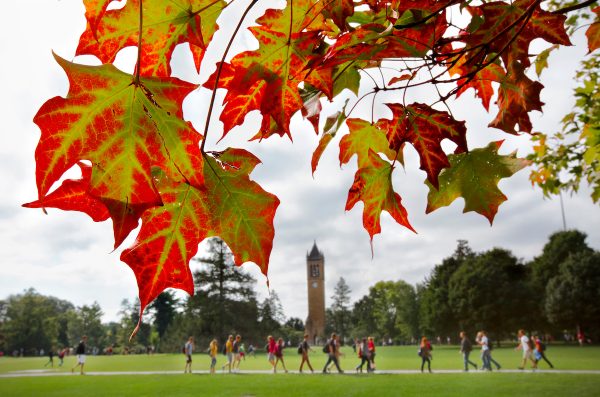
Overview
Graduate Training
Graduate students in the program learn the theoretical and conceptual bases of social psychology and personality, acquire strong methodological and statistical competencies, and develop critical skills in the areas of teaching and writing through coursework, empirical research, and interactions with their major professor(s). Students and faculty disseminate their research through conference presentations and publications. Most social and personality area graduate students obtain academic positions in universities and colleges, though some pursue career options in private or government sectors. Historically, all graduate students in the social and personality area have been fully funded as research and/or teaching assistants throughout their time in the program.
First year students become involved in the research programs of one or two social faculty immediately upon entering the program. The department prides itself on the relatively low student-to-faculty ratio, which allows for extensive individualized training. By the end of the first year, students are ready to begin the development of their master’s thesis research. Following the successful defense of their master’s thesis and completion of preliminary exams, each student works closely with their major professor, developing and carrying out a variety of research ideas, one of which culminates in the dissertation proposal. Students become increasingly independent throughout this process, and ultimately develop the competencies and experience to transition into research and teaching position in both academia and industry. Admissions decisions are based on grades, prior research experience, letters of recommendation, and fit with faculty research interests.
Social Area Faculty Members
- Dr. Craig A. Anderson, Distinguished Professor, Research areas of interest: Aggressive behavior, Media, Violence
- Dr. Kevin Blankenship, Associate Professor, Research areas of interest: Attitude change, Resistance to persuasion, Values
- Dr. Kristi Costabile, Associate Professor, Research areas of interest: Narrative, Autobiographical memory, Identity, Social perception
- Dr. Marcus Crede, Professor, Research areas of interest: Industrial/organizational psychology, Measurement, Meta-analysis
- Dr. Susan Cross, Professor, Research areas of interest: Cultural psychology, Culture of honor, Self-construal, Culture and relationships
- Dr. Douglas Gentile, Distinguished Professor, Research areas of interest: Media effects, Internet Gaming Disorder, Media multi-tasking, Mindfulness
- Dr. Zlatan Krizan, Professor, Research areas of interest: Intersection of personality with social behavior and self-regulation, Sleep, social emotions
- Dr. Tess Neal, Associate Professor, Research areas of interest: Expert and lay legal judgments, Social cognition, Public policy
- Dr. Alison Philips, Professor, Research areas of interest: Health behavior and habits
Recent Alumni
- Lukas Sotola (2024, Ph.D.) – Assistant Professor, Pace University
- El-Lim Kim (2024, Ph.D.) – Assistant Professor, Franklin & Marshall University
- Abby Boytos (2022, Ph.D.) – Assistant Professor, Seton Hill University
- Kathryn Bunda Pluta (2022, Ph.D.) – Postdoctoral Fellow, University of Florida
- Vanessa Castillo (2022, Ph.D.) – Assistant Professor, Coe College
- Marielle Machacek (2022, Ph.D.) – Research Psychologist, Center for Army Leadership
- Andreas Miles-Novelo (2022, Ph.D.) – Doctoral Faculty, Fielding Graduate University
- Ryan Ditchfield (2021, Ph.D.) – Assistant Professor, California State University, Fresno
- Nicole Hayes (2021, Ph.D.) – Postdoctoral Scholar, Worcester Polytechnic Institute
- Minjoo Joo (2021, Ph.D.) – Assistant Professor, Sookmyung Women’s University, South Korea
- Jeffrey Rokkum (2021, Ph.D.) – Senior UX Researcher, Jackrabbit Online Class Management Software
- Johnie Allen (2020, Ph.D.) – Data Analyst, Epic Games
- Adele Quigley (2020, Ph.D.) – Assistant Professor, Simon Fraser University
- Kelly Kane (2020, Ph.D.) – Assistant Professor, Elmira College
- Lanmiao He (2020, Ph.D.) –Data Scientist, Hy-Vee, Inc.
- Ann Lewis (2020, Ph.D.) – Senior Prod Manager Data & Analytics, Outreach
- Curt More (2020, Ph.D.) – Lecturer, University of Dundee
- Kimberly More (2020, Ph.D.) – Lecturer, University of Dundee
- Michael Tynan (2020, Ph.D.) – Assistant Teaching Professor, Iowa State University
Interdisciplinary Opportunities
Iowa State University has internationally recognized programs in neuroscience and statistics. Graduate students are encouraged to take advantage of these departments either through taking classes or through pursuing a quantitative certificate, a minor, a master’s, or a dual doctoral degree.
- Quantitative Certificate
- Human Computer Interaction
- Interdisciplinary Doctoral Program in Neuroscience
- Statistics
- Gerontology
- Psychology-Law Concentration
Prospective Students
The primary requirement for admission to the social psychology program is a strong interest in social psychology research. A successful applicant has often completed coursework in undergraduate research methods, statistics, and social psychology. The ideal applicant would have research experience and a strong grounding in methods, statistics, and social psychology.
Questions about the Social Psychology Program at ISU may be directed to the social area coordinator, Dr. Kristi Costabile (costabil@iastate.edu).
Affiliated Faculty
- Dr. Gary Wells, Emeritus
